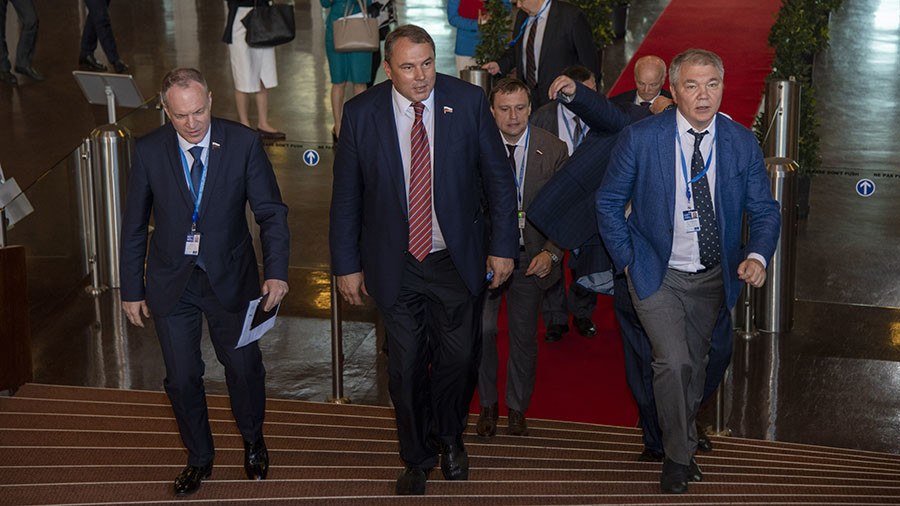The informal Baltic Plus group, created to counter Russia in the Parliamentary Assembly of the Council of Europe, advocates the same as Moscow - there was no “annexation” of Crimea. Such an ironic statement was made by the official representative of the Russian Foreign Ministry, Maria Zakharova.
“What a fine fellow: join in groups to continue Russian politics - a policy of non-recognition of the annexation of Crimea! How can one recognize that which was not? There was no annexation, therefore, it is impossible to recognize it, ”she wrote on Facebook.
Earlier on Tuesday, October 1, Ukraine, Latvia, Lithuania, Estonia and Georgia created an informal association, Baltic Plus, to counter Russia in PACE. The head of the Ukrainian delegation in the assembly, Elizaveta Yasko, said that this would contribute to the “return of confidence” in the organization.
“The task is to continue the policy of non-recognition of the annexation of Crimea, condemning Russia's occupation of Crimea, parts of Eastern Ukraine, Georgia and Moldova,” she wrote on Facebook.
The first step of Baltic Plus was the refusal to celebrate the 70th anniversary of the organization, which, according to Yasko, "has lost its authority in the eyes of millions of citizens of member states." The head of the Ukrainian delegation also called on other countries of the Council of Europe to join the new group.
Recall that Crimea reunited with Russia in 2014 as a result of a referendum in which over 96% of residents voted to join the Russian Federation. However, Ukraine and Western states do not recognize the results of a plebiscite.
It is also worth noting that the Ukrainian delegation will not be able to “oppose” Russia in the current PACE autumn session - Kiev refused to send its parliamentarians to the assembly in protest. Thus, Ukraine expressed a demarche against the return of the Russian delegation to the full rights in the assembly.
Commenting on the creation of Baltic Plus, Alexey Pushkov, member of the Federation Council committee on constitutional law and state building, expressed doubt that such a union would be “strong enough” to oppose Russia.
“A marginal group without a strong leader and reliable prospects. It would be more correct to call “Baltic minus,” he wrote on Twitter.
The Baltic Plus group, established at PACE, will interfere with the improvement of relations between Europe and Russia. Do you have enough strength? After all, these are 3 small EU countries plus three weak countries outside the EU. A marginal group without a strong leader and reliable prospects. It would be more correct to call “Baltic minus”.
- Alexey Pushkov (@Alexey_Pushkov) October 1, 2019These countries will not be able to influence the real state of affairs in European politics, Oleg Morozov, a member of the Federation Council Committee on Foreign Affairs, noted in a conversation with RT
“Both in spirit, in essence, and in purpose - these are political marginals that no one will hear ... The goal is clear - to spoil the process of Russia's return to PACE. It is clear that real, strong European states are in favor of this return. This design will look very ridiculous against the background of the general trend. The fact that she will not be heard is absolutely certain. They will give her a word, but hardly anyone today will take into account these political sobs. Nothing serious will pass like a runny nose, ”he said.
These countries do not fulfill the real task of confronting Russia, but only play a symbolic role, said Stanislav Byshok, a political analyst at the CIS-EMO international monitoring organization.
“There is no problem for Russia in this. These countries have a symbolic function — to continue to confront Russia, even when the trend of the global West is more likely to normalize relations with Russia. In this sense, there’s nothing to worry about, ”he told RT.
According to Byshok, this is largely due to the desire of the parliamentarians of these countries to prove themselves, "in the next election to show that one of their achievements is the creation of such a group."
- Russian delegates arrive at the meeting of the Parliamentary Assembly of the Council of Europe (PACE)
- RIA News
- © Dominic Buten
"The scales are clear on whose side"
It is noteworthy that just a few days earlier, Elizaveta Yasko, in an interview with the LB.ua portal, said that Ukraine needed to maintain a dialogue with Russia.
“I am a political scientist, I have always been interested in politics. But I need to feel and understand what is happening in the world, so to refuse to communicate with Russians is, I think, wrong. We cannot ignore Russia. We must protect our interests, but know what is happening, ”she said.
At the same time, Yasko then again condemned the return of the rights of the Russian delegation. According to her, this is a “question of the legitimacy and morality of the rules” of PACE.
It is worth noting that the position of Ukraine is fundamentally at odds with, for example, the opinion of France. On the same day, October 1, President of the Fifth Republic Emmanuel Macron announced that he supported the return of Russia to PACE.
“I fully support the choice that was made - to preserve (participation. - RT ) Russia in the Council of Europe, because the Russian people recognize European humanism, because they participated in its creation, because Russia's geography, history and culture are basically European, ”RIA Novosti quotes the French president.
However, of the two countries' positions, France is the most significant, as Paris plays a much more prominent role than Kiev, Byshok noted.
“A contrast may exist between relatively equal countries. Say, if Germany had one position and France had a different position, then this would be worth comparing. When large European countries stand for normalization of relations with Russia, and small European and non-European (if we take Georgia) are against, then the scales are clear on whose side, ”he concluded.

